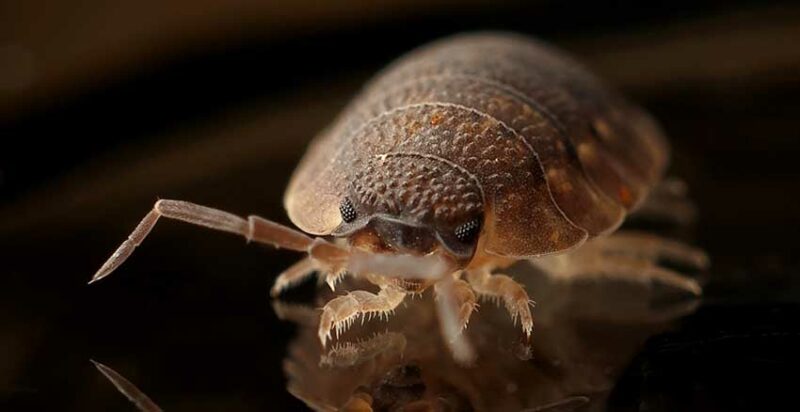Most people take a shower or wash their face before going to bed. Some even change their pajamas daily or every other day. Yet, few think about their bedsheets and pillowcases.
This may come up as a surprise, but your bed is chock-full of bacteria and dead skin cells. WebMD reports that pillowcases could harbor 17,000 times more bacteria than a toilet seat after just one week of use. Bed linens may also become a breeding ground for dust mites or even mold.

So, how often should you wash your sheets? Is it once a week, twice a month, or less often? The answer depends on your lifestyle habits.
The American Cleaning Institute recommends washing your bed sheets every two weeks or more often if you sweat a lot or have pets.
Other experts say that you should do it at least once a week.
Since most people spend about one-third of their lives sleeping, it makes sense to wash your sheets more often than not. This habit could be the key to better health.
Interested to know more?
Here’s what you know about the importance of clean bedding and how to figure out the best time to wash your sheets, pillows, and duvet covers.
How often do you really need to wash your sheets?
A Business Insider survey revealed that more than 50% of Americans don’t wash their bedsheets often enough. Most respondents said they cleaned their bedding a few times per month, once a month, or less frequently.
The same source reports that bed linens carry potentially harmful bacteria, spores, soil, lint, and bodily fluids. The chemicals in skin creams, body lotions, and soaps eventually end up on your sheets, too. Not to mention the dyes, bleaches, and other synthetic compounds found in the bedding materials.
Wrinkle-free sheets, for instance, contain formaldehyde. This chemical is classified as a potential human carcinogen. It may also have short-term health effects, like skin irritation, coughing, and sore throat.
Cotton sheets are not safer either. Most times, they contain synthetic dyes, softening agents, and other chemicals. That’s why you should always wash your new sheets and other bedding items before use.
Regular cleaning can further eliminate some of these chemicals along with dirt and bacteria buildup. Washing your sheets more often also keeps dust mites at bay. Plus, you’ll get rid of fungi and other microorganisms lurking in your bed.
What happens if you don’t wash your sheets?
So let’s say you decide not to wash your sheets for an extended period of time. What will really happen to them? Let’s find out below.
#1. Dust mites will multiply.
The closer a fabric is to your skin, the more frequently it should be cleaned.
The human body sheds 600,000 skin cells every year. Many of those dead skin cells end up on your bedsheets and pillowcases, attracting dust mites.

These tiny bugs produce about 20 waste droppings per day, which can be easily inhaled. Dust mites (and the waste they leave behind) may trigger allergies, asthma-like symptoms, coughing, and facial pain.
Bed bugs carry health risks, too. These wingless insects feed on the blood of animals and humans, causing skin rashes, blisters, itchiness, and hives. Their bites may lead to anemia in the long run.
Most bed bug species tend to live where people sleep or rest. As their number grows, they can invade other spaces and cause infestations.
While there’s no 100% guaranteed way to prevent these pests from entering your home, washing your sheets regularly may lower the risk of contamination.
#2. Dangerous bacteria will grow.
The longer you wait to change and wash your sheets, the more bacteria will be lurking in your bed.
In one study, researchers asked a volunteer to use the same duvet cover, bedsheets, and pillowcases for 28 days. Four weeks later, his bedding was infested with Bacteroides and other germs responsible for gonorrhea, pneumonia, and throat infections.

Bacteria and fungi accumulate in bedding over time. They not only trigger allergic reactions but may also affect your skin, eyes, and immune system. These microorganisms can worsen asthma and interfere with your sleep.
#3. Hello, fungal infections.
Your body has between two and four million sweat glands that open onto the skin surface. These microscopic structures are active around the clock, including at night. The variations in body temperature and heart rate can further increase sweating during sleep.

The sweat on your body eventually ends up on the sheets and pillows, creating a perfect environment for fungi. At first, you may experience itchiness, dry skin, peeling, or cracking. Over time, it’s possible to develop fungal infections, such as ringworm or athlete’s foot.
In 2005, researchers examined 10 synthetic and feather pillows aged 1.5 to 20 years. All pillows had traces of Aspergillus fumigatus, Aspergillus pullulans, Penicillium, and other fungi. Some of these microorganisms are allergenic and may cause breathing difficulties.
Mold and fungi thrive in damp environments. The only way to prevent them from spreading is to thoroughly wash your sheets, pillowcases, blankets, and duvet covers. Your mattress and pillows need regular cleaning, too.
How often should you wash your sheets if you shower before bed?
As mentioned earlier, the American Cleaning Institute suggests washing your sheets every 14 days or so. Other experts recommend washing them once per week. But these rules are not set in stone.
People who shower before bed may be able to wash their sheets a little less frequently, but there are more factors to consider besides your own body.
Consider the following aspects, too:
- Whether you sleep alone or with a partner
- Whether you sleep with pets or children
- How much you sweat at night
- Your lifestyle habits, such as eating in bed
- The season of the year (change your sheets more frequently in the summer)

Generally, people who let their pets sleep in bed with them should wash the sheets every three to four days. The same goes for those with asthma or allergies.
Wash your bed sheets more often if:
- You’re sensitive or allergic to dust
- You have a fungal infection affecting the skin or hair
- You sleep naked
- You sweat a lot during sleep
- You don’t shower before going to bed
- You have eczema, acne, or other skin disorders
- You’ve been ill
- You move around a lot during sleep (this habit increases skin shedding)
- You drool over your pillowcase
- You sleep with your makeup on or apply skincare products before bed
To stay on the safe side, change your sheets about once a week. Do it more often if you tend to wake up with a stuffy nose, skin rash, or itchy eyes. Wash the bed immediately if you notice any blood stains, foul odors, yellowing from sweat, or pet dander.
How often should you wash your pillows?
Keeping your bed linens clean is just as important as washing your sheets. Don’t forget about your pillows and pillowcases, which are a breeding ground for fungi and bacteria.
- Pillowcases — wash them along with your sheets or every two to three days if you have acne-prone skin
- Pillows — wash them every three to six months and replace them every year or two

How often should you wash your bedding?
The good news is, duvet covers and blankets require less frequent washing than your bedsheets and pillowcases. Follow these guidelines to keep germs at bay:
- Duvets — give them a thorough cleaning at least twice a year
- Blankets and comforters — wash them every three months or so; toss them in the dryer on high for 10 to 15 minutes between washings to kill germs
- Mattress protectors — wash them every two months or more often if you have pets or notice any stains
- Mattress — vacuum it every few months using a soft brush attachment
Live Science reports that a two-year-old pillow is about 10% dead mites and their droppings by weight. A used mattress may have up to 10 million mites.
Considering these facts, it makes sense to wash and replace your bed linens as often as needed. Think of it as an investment in your health.
How to Wash Your Sheets
As a general rule, follow the manufacturer’s instructions before washing your sheets. If the sheets are new, prewash them with vinegar and baking soda to keep them soft and eliminate chemical residues.
Take these steps for a thorough cleaning:
- Lay your sheets in the machine instead of wrapping them; don’t overload the washing machine.
- Choose organic or hypoallergenic detergents whenever possible; avoid using too much detergent as it can leave stains and residues on your bed linens.
- Wash the sheets at 140 degrees Fahrenheit (60 degrees Celsius) or above to destroy pathogens and remove stains.
- Run them through a normal wash cycle with hot water and organic liquid detergent, followed by a dry cycle on low heat.
- Rinse them twice to remove detergent residues.
Remove your bed linens from the washer as quickly as possible to prevent mold growth. Let them dry in direct sunlight if possible.
Ultraviolet light has the ability to kill viruses and bacteria, reports a 2018 study published in the journal Microbiome.
If that’s not an option, tumble-dry your sheets at low heat or hang them to try. Iron them to kill any remaining bacteria and dust mites.
Note that silk, satin, and linen sheets require extra care. Use a detergent made for delicate fabrics and wash them separately from other bedding items.
Most manufacturers recommend washing silk sheets by hand. If you prefer to use the machine, put them in a mesh bag and wash them on a delicate cycle at 86 degrees Fahrenheit (30 degrees Celsius).
Let them dry away from direct sunlight and iron or steam them at a low temperature.
How to keep your sheets clean between washes?
Even if you wash your sheets once a week or more often, they can still harbor bacteria.
Follow these rules to keep your bedsheets clean and fresh between washes:
- Remove your makeup and take a shower before going to bed.
- Cover your pillow with a towel if you apply creams or serums on your face before sleep. Remove the towel and use a new one the next day.
- Use a full encasement pillow protector and a mattress protector. These will prevent bacteria, mites, and more from getting into your mattress or pillow while protecting your bed from stains and liquid spills.
- Put a blanket on the sheets if you’re going to let your pets in bed. Vacuum the blanket every day and wash it every few days.
- Avoid eating or drinking in bed.
- Steam your bed linens regularly to kill most germs
- Use a homemade linen freshener containing essential oils to get rid of microbes
Wash your pajamas every three to four days, recommends the American Cleaning Institute.
Do it more often if you sweat excessively or have a skin condition. Otherwise, bacteria can accumulate in the fabric and pass to your sheets, mattress, and other linens.
Final Thoughts
Nothing compares to the feeling of sliding into clean sheets. But the benefits of washing your sheets regularly go beyond better sleep. This habit may also improve your health, reduce acne flare-ups, and keep allergies at bay.
So, how often should you wash your sheets? Ideally, do it every week or once every two weeks.
Consider washing them more frequently if you have open lesions, fungal infections, or skin conditions.
Use a vacuum cleaner with good suction to prevent dust mites from settling in your bedroom.
Open the windows daily to reduce humidity and let fresh air in. Replace your bed sheets every two or three years and use organic products to keep them clean.
How often do you wash your bedsheets? Are there any other tips you’d like to share? Let us know in the comments section below!
FAQ
Not washing sheets often enough can lead to dangerous bacteria growth, viruses, bed buds, or mold in your bed. For the healthiest “you”, remember to wash your sheets often.
For most sleepers, it is best to wash your sheets at least twice a month. If you have kids or pets in the bed, you may want to do it 3-4 times a month.
For some sleepers, it’s OK to wash bed sheets only once a month. Sleepers without other partners, pets, or kids sharing the bed can sometimes get a longer timespan between washes.
Showering before bed is another way to ensure you’re crawling in bed cleaner than if you didn’t bathe.
Another tip: when you get out of bed in the AM, don’t make your bed right away. Give your sheets a minute to air out, which can help them dry from any nightly moisture. Warm air and moisture are harboring grounds for all kinds of nasty bed things.



